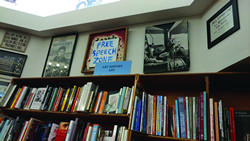Ranger Halt once said, “It’s only impossible if you make it impossible.” I remembered this line from John Flanagan’s book series, The Ranger’s Apprentice, during every moment I have faced a challenge since I read it at the age of ten. It made me realize that books of any kind should be treated like milk for the mind: prefer the whole on the shelf as opposed to the skim on Sparknotes.
Edward Palluzzi, a junior health studies student, said, “Personally, I find myself using my textbooks for my major classes more than I do my health electives, although sometimes the books from my elective classes are great references for major classes. Either way, I pretty much get good use out of all of my textbooks in one way or another.”
Your textbooks do not have to be just an essential tool to help you walk on graduation day. While they help you fulfill academic needs, they give you something else in return for spending nights with them until three in the morning. In some cases, students can walk away from a class with more than just knowledge on energy forces, the stock exchange, or feminism. They walk out of the classroom with inspiration to pursue a field of practice.
I tell anyone who asks about my future goals, “The ultimate goal is to write a novel and teach a class how to do the same.” Admittedly, I have seldom drifted onto my phone during readings to check out Clash of Clans or to tag my friends in dog memes. Sometimes as students, we read so much that we end up craving a brief release from the duty of soaking up different authors’ ideologies and stories.
The Ranger’s Apprentice series follows a young man named Will who must be assigned a role in a medieval-like society. He wants to join Battle School, but he is assigned one of the rarest apprenticeships in the land, which is the Ranger position. Halt, a member of the Ranger Corps, becomes his master and whips him into the shape of a cloaked spy. While the apprenticeship is difficult for Will to manage, Halt drops helpful advice on how to survive in life. Halt’s lesson regarding impossibility is a simple one. The more you decide to quit, the less chances you give yourself to achieve your goals.
The Deltora Quests, written by Emily Rodda, follows a trio of heroes as they travel to find mystical gems that will stop the evil Shadow Lord from conquering the kingdom of Deltora. Stories may not help us solve math problems, which is great considering I enjoy narratives a lot more than finding square roots. However, this does not mean they cannot give us something that reinforces who we become.
Mary Kate Azcuy, an associate professor of English, said, “My mother read me Greek myths and fairy tales, which I think created my love of mythology. My favorite myth is The Odyssey. When I first read the epic, I was a freshman in high school; it was the Fitzgerald translation. My junior year high school Honors teacher took three of us to Princeton University to hear Robert Fagles discuss his translation approach to the epic poem. My life was changed.”
“In graduate school at New York University (NYU), the poet Allen Ginsberg had us read the epic and discuss it relative to craft and American poetry. Now, I teach The Odyssey to my students and each time I re-read the poem, a new aspect of the complexities and layers comes to me. In my research, I write about the American poet Louise Gluck, who writes about Odysseus and Homeric characters.”
Not all books are narratives. This neither means passion was not put into the words behind them, nor do books not serve an intended purpose. It takes heavy interest and a lot of time to write one. Each one has a different lesson, regardless of the content.
If you are assigned a book you don’t like to read in class, take a moment to do the following. Take a step away from the book and ask, “Why would anyone write something like this?” Once you think of an answer, begin to read the book again. Read it slowly. Extract the meanings from each sentence. Slowly, you will become a scientist dipped in the field. Delicately, you will find out the behavior of sales. You will learn how to join the conversation on contemporary issues.
Danielle Gonzalez, a sophomore history student, said, “I have actually been really pleased with the books assigned for my classes. Specifically, when dealing with topics such as race, there has been rich insight and I have learned more about racial issues here than I did at Rutgers interestingly enough, though I wasn’t a history major there. I have been able to apply everything I’ve learn and read to everyday life.”
The more you immerse yourself as the writer of the book, the more you become an expert on what the book is trying to elaborate. I analyze books to learn the craft of storytelling so that I may write my own novels with their own messages. My passion must remain with the written word in order to do this effectively.
Even if a topic seems tedious, you should value a book just because it has something to say. The novels I read when I was little helped me re-discover what it is like to passionately read a text its creator considers to be a work of art. As an artist, I owe it justice to not trade it off for a college diploma.
PHOTO TAKEN by Alexandria Afanador


